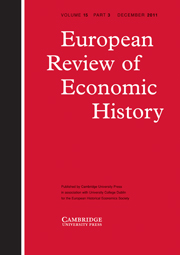Article contents
Looking ahead from the past: The inter-temporal sustainability of Portuguese finances, 1854–1910
Published online by Cambridge University Press: 16 October 2003
Abstract
The history of public finances in Portugal from the middle of the nineteenth century to World War I is distinguished by the pursuit of an ambitious programme of public investment in infrastructure, and by the negative financial consequences this elicited, culminating in the 1892 default. In this article we approach the Portuguese financial history of this period with a relatively new methodology for evaluating financial sustainability, which emphasises the inter-temporal nature of government budgeting. The results obtained allow us to quantify the distance that separated Portuguese finances from a sustainable path throughout the period. Although the generational imbalance of Portuguese finances at the time seems massive in the context of today's benchmarks, its economic and financial impact should have been more limited, given the government's relatively low weight in the economy and the favourable demographic pattern.
- Type
- Research Article
- Information
- Copyright
- © 2003 Cambridge University Press
- 6
- Cited by


